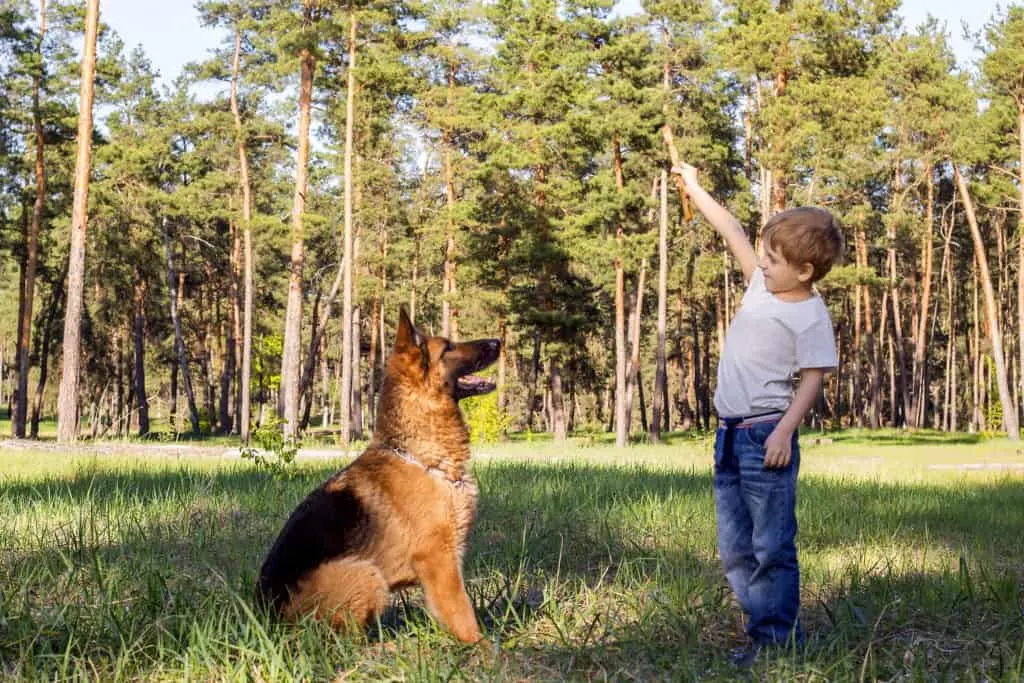
The German Shepherd is one of the most beloved canines for good reason. With their fierce loyalty to their families and their striking appearance, they are widely treasured by dog lovers around the globe.
Though the GSD proves to be a wonderful companion, many wonder if a dog of this size can be safe in a home with children.
In this article we’ll dive into the question of whether the German Shepherd is good with kids, and ways you can help your GSD become a safe member of your family.
Click Here to Jump to a Section
So are German Shepherds good with kids?
The answer to the question of whether a German Shepherd is good with kids is a simple yes, just as long as you understand the nature and temperament of the dog that you are bringing into your home. You must provide your GSD with a home that allows them to thrive in order to expect a safe and productive relationship between children and your dog.
German Shepherds have an array of qualities that make them so wonderful, such as loyalty and protectiveness, but these same qualities can cause problems if they are not approached correctly.
To help you better understand your Shepherd, let’s now take a closer look at their specific qualities.
When it comes to a specific breed being safe around children, it’s important to remember that each dog is a product of their environment. While each German Shepherd offers a number of qualities that would make them a wonderful addition to any family, these same qualities can be dangerous when they are not in a home that allows them to thrive.
The German Shepherd can be a loyal and trustworthy protector for the children in your home as long as you understand what it takes to help your German Shepherd become the best version of themselves. Since this is such a wonderful canine to begin with, it really does not take much once you correctly offer your GSD the love they seek.
Setting Your German Shepherd up for Success
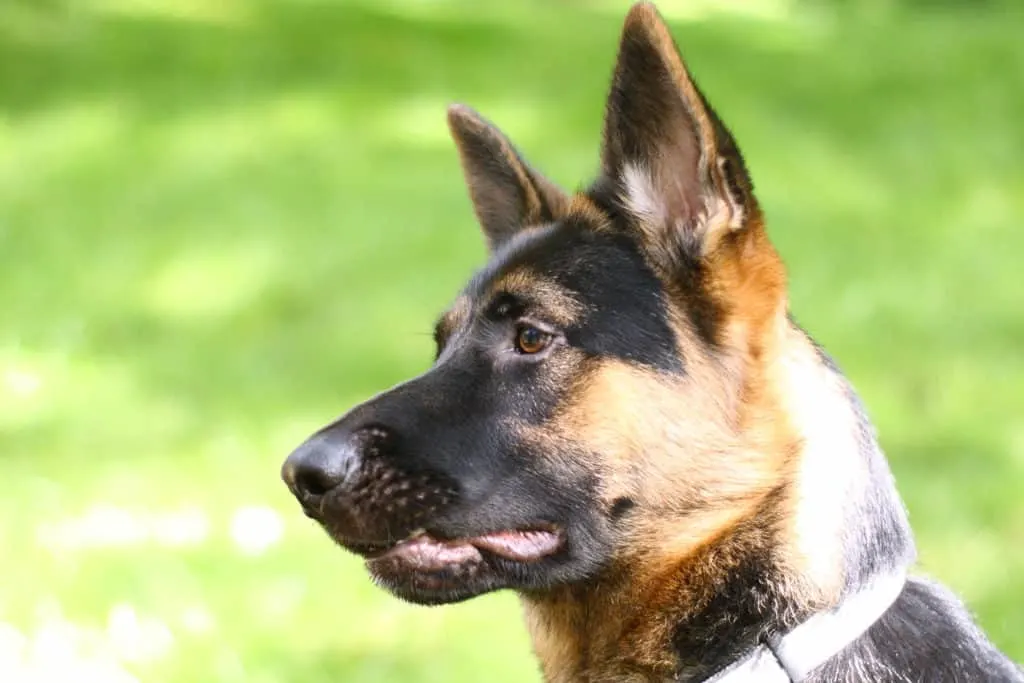
Just like any other breed of dog, the German Shepherd will be an incredible friend to your children if they are brought up in a home that offers them proper training and support.
The German Shepherd is known to be one of the most protective, loyal, and intelligent dog breeds around. Though these are all qualities that make them so wonderful, these qualities can also be a recipe for disaster when they are not properly trained and socialized.
If you are looking for a dog that will shine in the position as your child’s best friend, the German Shepherd may be the perfect pup for you. Once you understand their defining qualities and are dedicated to helping them become the furry friend of your dreams, you will have a companion that captures the hearts of everyone in your home.
So what are the German Shepherd’s qualities that you should educate yourself and your children on?
Understanding the German Shepherd and Protection
The German Shepherds are widely used to fill important jobs such as police dogs, search and rescue dogs, and military dogs. While this has a lot to do with their intelligence and eagerness to obey, their ingrained need to protect also plays a major role in choosing GSDs for these jobs.
The first German Shepherd Dogs were originally bred to protect their owners belongings, whether it was their land or their homes.
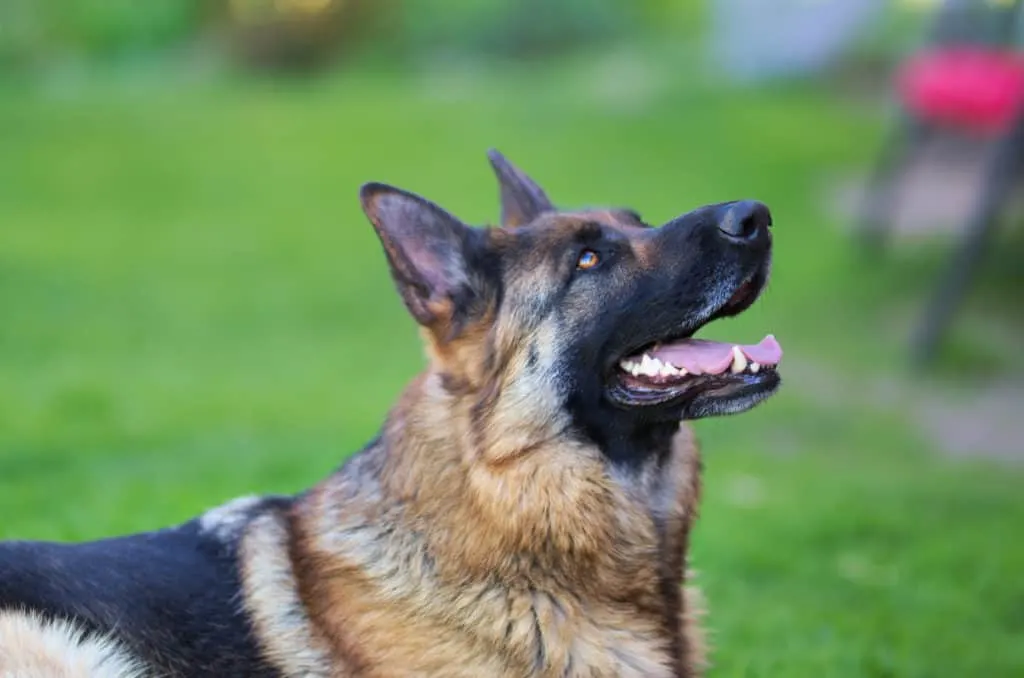
When a habit like this has been ingrained in the breed for hundreds of years, it’s no wonder they appear to instantly protect their owners without any specific training. Being protective is just part of who a German Shepherd is, and they carry this trait with them throughout their lives.
With the combination of a German Shepherd’s herding experience and their need to protect, you end up with a dog that has a deep need to protect their family.
Generally speaking, the willingness to protect their loved ones is an incredible quality for your German Shepherd to have. While this behavior is a huge reason as to why the German Shepherd has become so popular, it is a quality that needs to be fine tuned to ensure safety.
With any dog that is protective by nature, they will need to be properly raised to ensure the safety of the children in your home.
This involves proper socialization, obedience training, and plenty of exposure to other children and other animals. If a German Shepherd is brought into a home with small children that has never been exposed to children before, this will of course be dangerous.
If you want a GSD that can be your child’s best furry friend, just make sure to socialize them and offer obedience training from the moment they enter your home.
Understanding the Personality of a German Shepherd
The standard description of the German Shepherd’s personality is dignified, loyal, and easy going. While most German Shepherds have similar qualities to offer their family, their personality, in many cases, is a product of their environment.
When a German Shepherd is raised in a fulfilling environment, they can be a joyful and goofy companion to the children in your home. In a loving home, they are easy going and approachable, and can be a wonderful playmate for the children and other animals in your family.
Just like with any other dog, you will need to follow a few steps to emphasize these desirable personality traits in your Shepherd, and help to diminish the negative personality traits they can display.
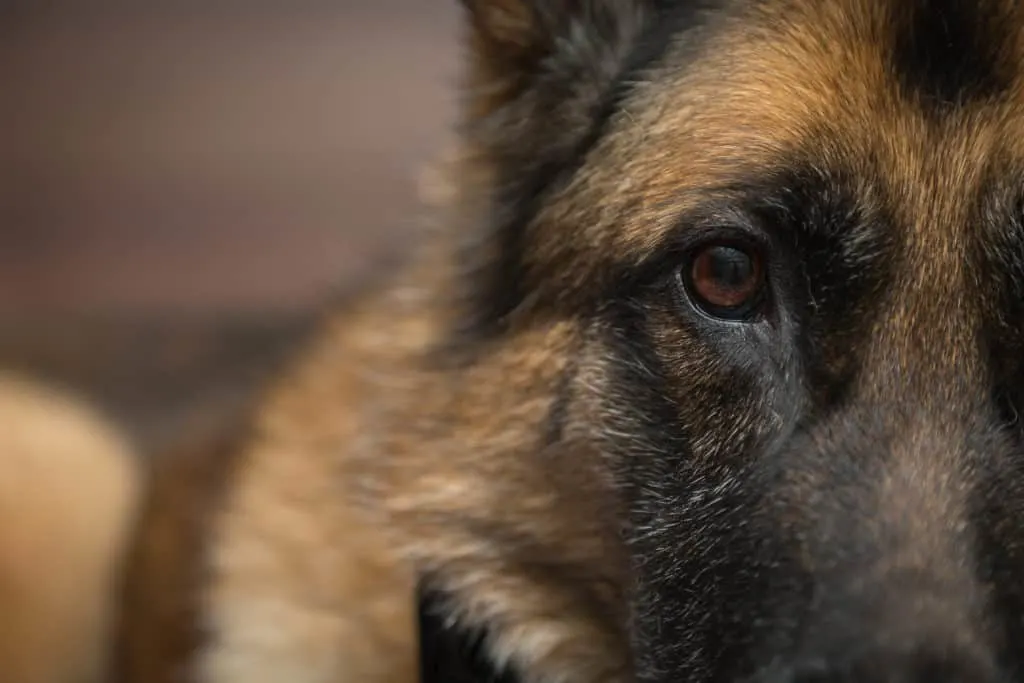
While the German Shepherd can be an incredibly lovable pup, they are able to flip a switch quickly and become stern and protective when needed. You may notice this when they are approached by someone they don’t know, or if they are ever in a situation that makes them uneasy.
While these behaviors are necessary at times, proper socialization will prevent this stern behavior from occurring when it’s not needed.
By helping your German Shepherd gain confidence with proper socialization and training, your GSD is more likely to be the goofy and trustworthy dog that you love rather than a dog you have to question around your children.
Instilling proper training and socialization tools will help your pup shine in the role of your children’s best furry friend.
Socializing Your German Shepherd
Socialization is the most important part of helping your German Shepherd become a wonderful companion for the children in your home.
Exposing your German Shepherd to other surroundings, people, and dogs is an important part of their development, but even more important for a German Shepherd that will be around children.
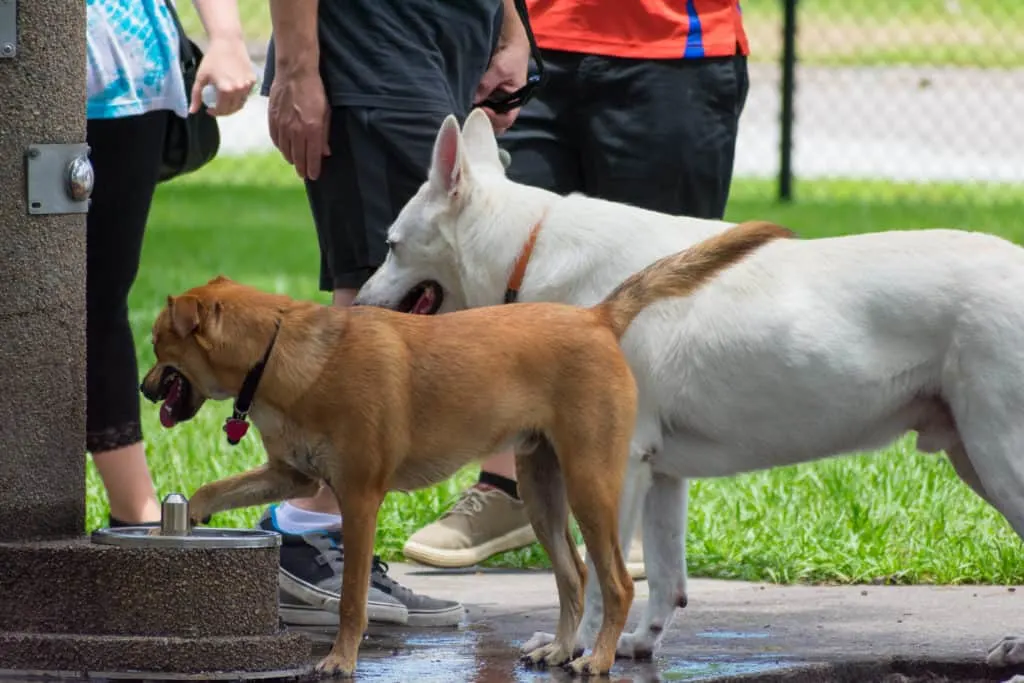
Much of their socialization process is about teaching them appropriate interactions with the other people and animals in their life.
When you socialize your GSD, you are showing them how to positively respond to non-threatening factors. By learning that not everything is out to get them, they are more likely to have kind and caring interactions with other people and children.
An unsocialized dog may feel threatened by a child coming into their personal space, or by the friend that your kid invites over to your house after school.
By opening up their world and exposing them to new surroundings, you are essentially showing them what positive interactions look like, so they know the difference when they or you are actually being threatened.
The German Shepherd can be the most loyal and trustworthy companion that your family could ever dream of, but they need a little help in order to get there. A well socialized GSD can be an incredible friend for your children to grow up with.
Exercise and Your German Shepherd
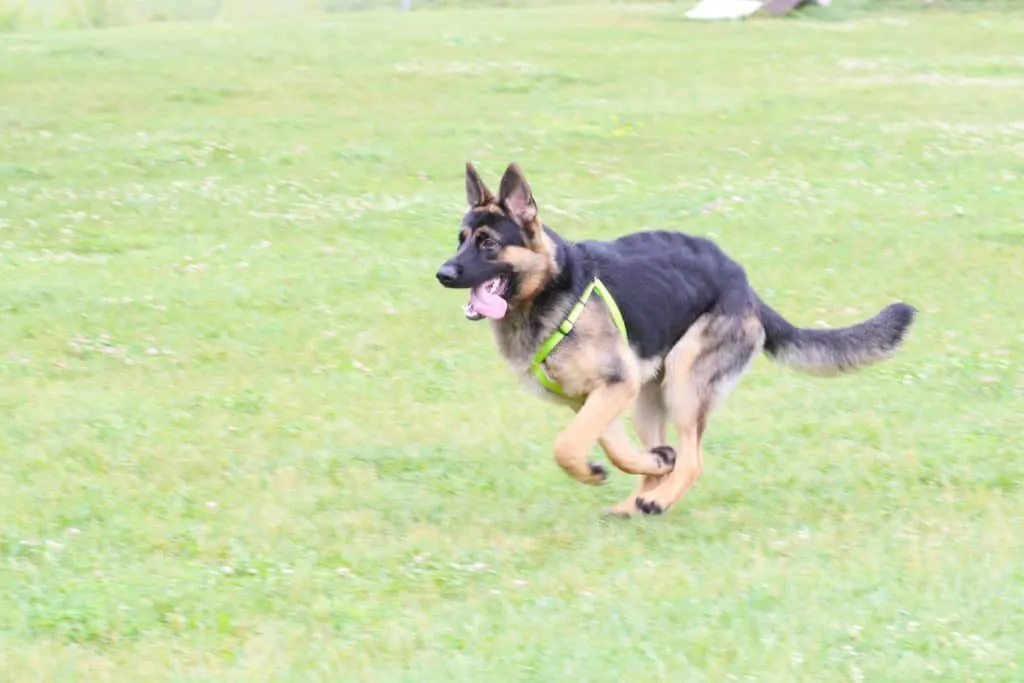
While you may not put two and two together, your German Shepherd’s exercise habits can play a huge role in how they interact with children.
The German Shepherd is an extremely energetic breed that requires anywhere from 30 minutes to 1 hour of exercise each day.
Any time a German Shepherd is lacking this daily play, they are more likely to turn to destructive behavior and other undesirable behaviors. This can translate to their interaction with children as well.
If a German Shepherd is bursting at the seams with extra energy they are unable to run off, they may be a bit more rough with the children in your home.
A hyper pup may resort to jumping up on children, snapping and biting due to excitement, and just being a bit too powerful for children to handle. Even without meaning to, this can cause your Shepherd to injure a child.
By engaging in daily exercise and play with your German Shepherd this can help them become more manageable, and prevent possible injury as they interact with the children in your home.
This can even be an opportunity to help your German Shepherd and children bond by allowing them to play together and burn off some extra energy on both ends! A daily game of catch or a quick game of tug of war can be a wonderful routine that your child and dog share.
Educating Your Children on Safe Interactions
While you may think the main factor behind safe dog and child interactions lie on the dog’s shoulders, this is not entirely true. When it comes to a dog spending time with children, the child in the equation has a responsibility in this as well.
A kid that is well educated on proper dog interaction is less likely to become injured during their play time, and is more likely to have a healthy bond with their furry friend.
So how do you teach your children how to safely interact with children?
Promoting A Healthy Bond Between Your Shepherd & Children
When it comes to strengthening the bond that your child has with their Shepherd, there are a few ways to go about this. Some safe and fun ways to promote responsible play between your dog and child includes:
- Petting: It’s important to teach your child how to kindly pet a dog. Once your child has learned to pet in a way that’s not uncomfortable for your GSD, they can give your pup all the belly rubs that they desire. This is extremely important in younger children, as they aren’t always aware of how rough they are being.
- Training: While most dogs obey the adults in their home after their obedience training, they should be able to listen to the children in the home as well. Ideally, your dog should respond to every human in their home, no matter how small.
By keeping your kid involved in your Shepherd’s basic obedience training, they can take pride in the fact that their pup will listen to their commands. Once your dog learns basic commands, teach your child these commands as well.
This way, they can have your Shepherd sitting, shaking, and performing any other special tricks for them as well. This can be a rewarding process for your child and Shepherd! - Grooming: Daily brushing can be the perfect time for your Shepherd and child to bond. Since the German Shepherd has thick and coarse fur, they benefit from weekly or even daily brushing.
What better way to teach your children the importance of pet care, all while letting them participate in an activity that they can both enjoy. Grooming is a wonderful way to teach your child responsible pet ownership. - Play: Since your German Shepherd needs daily exercise anyways, letting your child be their source of play can help you and your dog at the end of the day.
There are a number of ways your child can help to get your GSD up and moving, and each activity is just another moment in which they can enjoy time with their furry companion. - Chores: Since some of household chores include our canine companions, what better way to get your children involved than teaching them what goes into taking care of a dog?
You can teach them how to offer their daily meals, take them on walks, clean up after them, and any other pet chore that you may need help with.
Teaching Your Children To Avoid Dangerous Interactions
The most important part of establishing a relationship with your German Shepherd and your child is showing them what not to do in the presence of their canine friend.
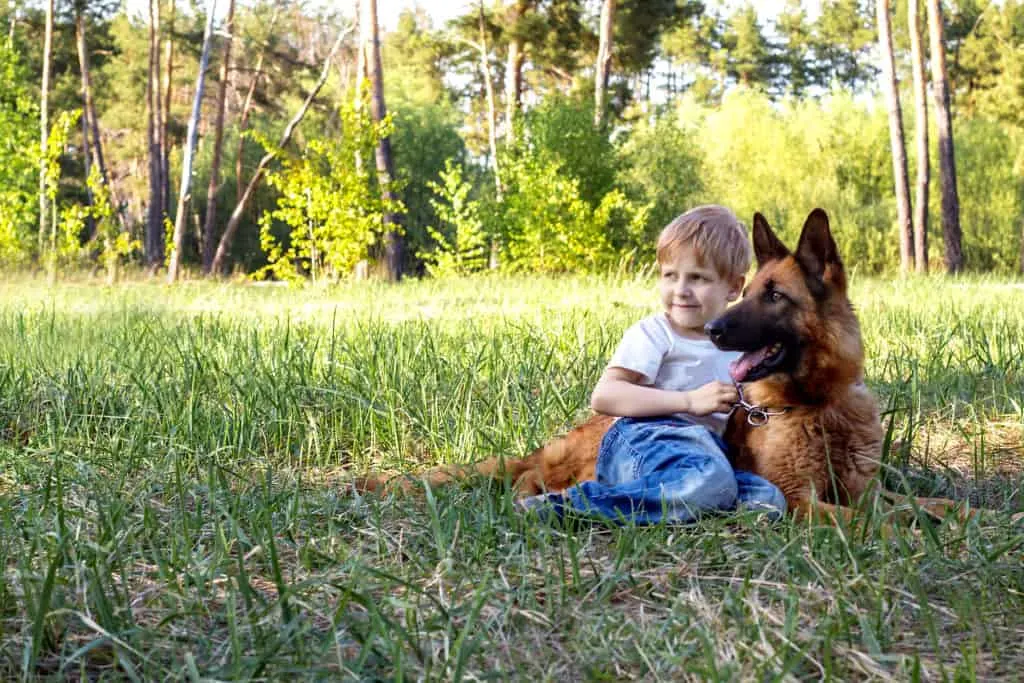
Humans require respect during our daily interactions with others, and our dogs deserve that same level of respect as well. Some important things to teach your child about what not to do in the presence of their German Shepherd and other canine friends include:
- Teaching the children in your home about personal space is extremely important when it comes to the care of our canine friends.
Even though it’s common to see photos of children lying on top of dogs, or squeezing their faces tightly for kisses, this is not an ideal situation for your child to be in.
While it may be okay most of the time, there is always a chance for your pet to get irritated and snap. We respect the personal space of our human friends, so our pets should get the same respect. - Make sure that your child is aware of the proper way to hug and pet your dog, without squeezing and hurting them. Rough play with children can result in serious injury to your Shepherd friend.
This is unfair to the dog, and can also result in your pup biting or injuring your child in the process. - One of the most important lessons for a child to learn is to never approach a dog while they are eating, especially a large dog like the German Shepherd.
Even the sweetest of pups can display food aggression, and you never want your child to be on the receiving end of that aggression. Meal time is a personal time for your dog, and they can become extremely protective over their bowl in an instant.
It’s always best to leave your dog alone when they are eating, chewing a bone, or snacking on treats.Many dog bites in children occur due to food being present in the equation. - Humans don’t enjoy being teased, and our dogs are no different. Make sure your children know to never purposely aggravate your German Shepherd. It’s not fair to your pup, and it can result in your dog snapping at or injuring your child as a result.
When it comes to proper interaction between your GSD and your child, it all comes down to respect for animals. As long as you teach your children the respectful ways to interact with the dogs in your home, you automatically reduce the risk of canine aggression toward your children.
German Shepherds and Young Children
When you are researching a German Shepherd’s ability to be a great family dog, you will likely see photos of babies cuddling on top of their German Shepherd pets.
Yes, Shepherds can be wonderful protectors to their favorite humans, but it’s still important to be safe when it comes to small children and dogs.
German Shepherds are large dogs that often bring with them incredible strength. Even the sweetest of dogs can accidently harm a small child due to their size alone, so it’s important to be aware of this if you have any young children.
Though you may trust your German Shepherd completely, it’s always best to supervise each interaction that your child has with your furry friend. This way, you can prevent any injuries if your dog becomes too rough or playful.
Another factor to keep in mind is how a young child is less likely to follow the basic rules of canine respect. Toddlers and babies are unable to understand the importance of being kind to dogs, meaning they can easily cross boundaries without being aware of the dangers.
Young children are known to tug on dog’s ears, poke them in the eyes, pull on their skin, and more. While your child does not intend to harm your Shepherd, they don’t know that. These behaviors can cause your dog to snap at your young child, and may seriously harm them in the process.
No matter how wonderful of a companion your German Shepherd may be, you should ALWAYS supervise their interactions with your small children. Things can escalate quickly, and you never want to put your child and dog in a compromising position.
Important Tips to Remember for German Shepherds and Kids
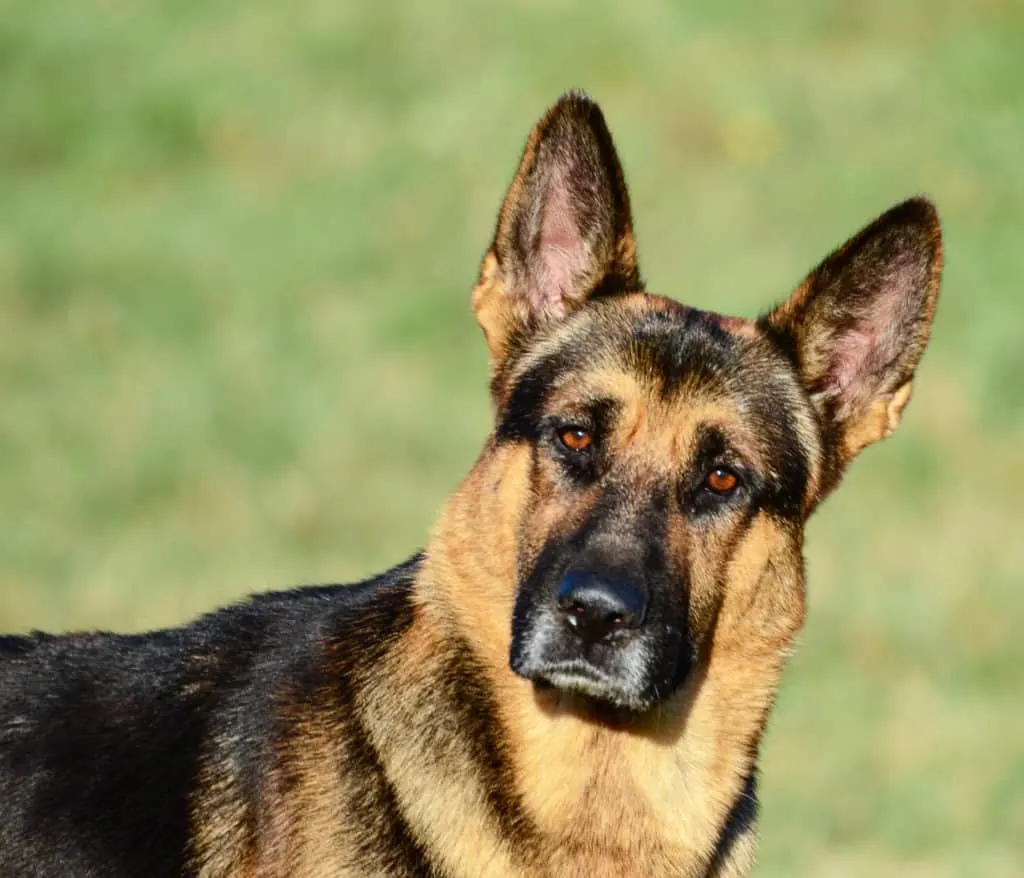
Now that we’ve covered the most important factors involving the German Shepherd and their relationship with children, let’s review some important tips to keep in mind!
- Always supervise your German Shepherd when you first bring them around children.
- The best way to keep your children safe around ANY dog is to give your pet the tools to success.
- Socialize your German Shepherd from the moment you welcome them into your home, as this will make them a more trustworthy member of your family.
- Basic obedience can also help your pup gain confidence in themselves, making them a safer member of your family.
- Try to introduce them to children outside of your own so they are not fearful or aggressive toward other children.
- Understand your German Shepherds protective instincts and fine tune these behaviors with proper socialize and training.
- Make sure your German Shepherd is engaging in daily exercise to help diminish undesirable behaviors in your home.
- Educating your children on safe interaction with dogs is the number one way to prevent injuries in the future.
- Since toddlers and babies are unable to understand the dangers of their actions towards dogs, it’s important to supervise each interaction they have with your Shepherd.
- Never allow your children to disturb your German Shepherd while they are eating, chewing a bone, or consuming treats. Even the sweetest of dogs can experience food aggression.
- Once you are sure that your German Shepherd and child have a safe bond, try to implement different activities to help them bond. This can mean grooming, daily play, obedience commands, and more.
Final Thoughts
Overall, your German Shepherd has the ability to be the best friend your child could ever ask for.
As long as you are dedicated to helping your German Shepherd become a safe member of your family, they can be a wonderful companion for everyone in your home!
